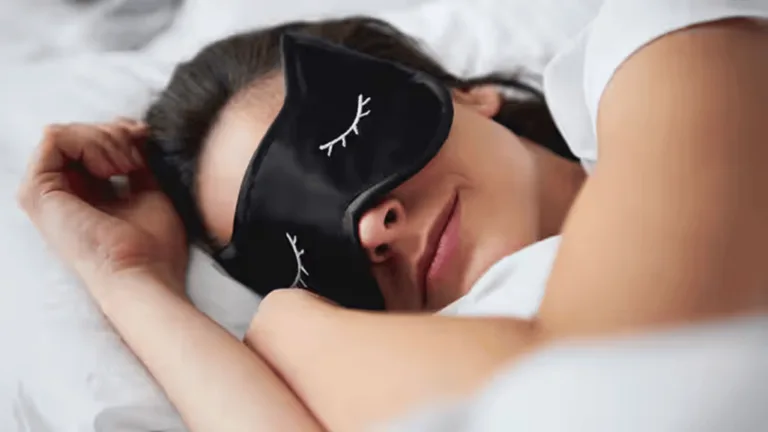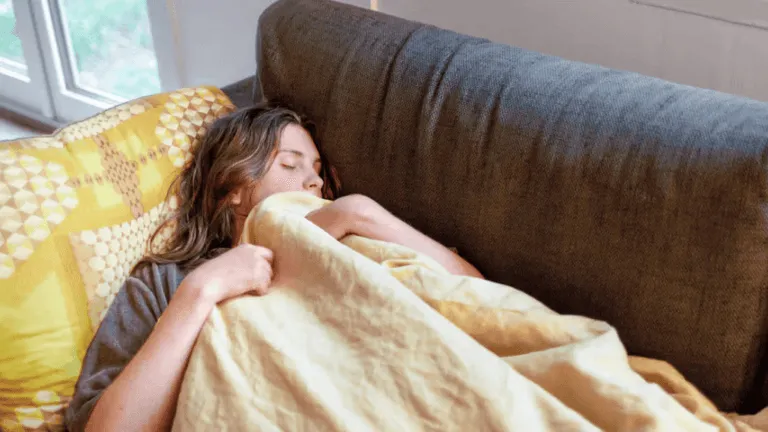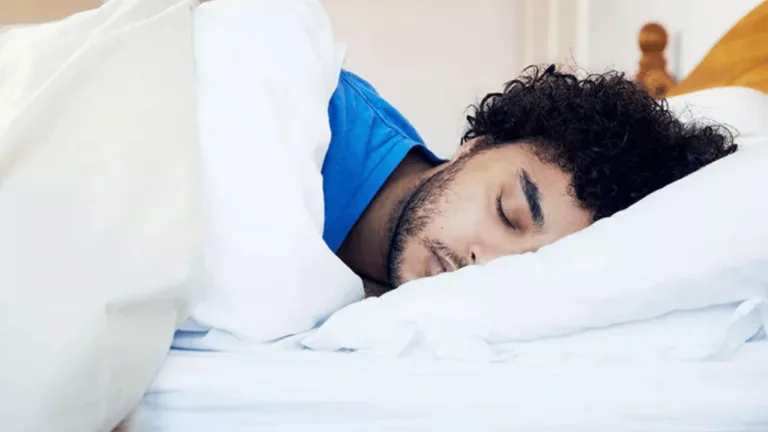Many people wonder if exercising before bed is good or bad for sleep. Traditional advice says to avoid exercise before bed. But recent studies suggest that when you exercise might not matter as much as thought.
Research shows that 30 minutes of moderate exercise can improve sleep quality right away. It’s best to exercise 1 to 2 hours before bed. This lets endorphins drop and the brain relax. Exercise boosts deep sleep, where the body and brain get refreshed.
But, how you react to evening exercise can vary. Some people might feel too awake because their body temperature goes up after working out. This could make it hard to sleep if you exercise too close to bedtime. The good news is that exercise can quickly improve sleep, not just after months or years.
Key Takeaways
- Moderate aerobic exercise at least 30 minutes a day can improve sleep quality on the same night.
- Exercise should be done 1-2 hours before bedtime to allow endorphin levels to decrease and the brain to wind down.
- Exercise enhances slow wave sleep, known as deep sleep, where the body and brain rejuvenate.
- Individual variability in response to evening exercise should be considered, as some may experience heightened alertness post-exercise.
- The impact of exercise on sleep quality can be experienced on the same night, indicating a swift benefit in terms of sleep improvement.
The Relationship Between Exercise and Sleep Quality
Regular exercise and sleep quality are closely linked. Physical activity can improve sleep architecture and mood. A study by the National Sleep Foundation showed that 83% of vigorous exercisers had very or fairly good sleep quality. This was true, no matter when they exercised, unlike non-exercisers who had only 56% good sleep quality.
Benefits of Regular Exercise on Sleep
Regular exercise has many sleep benefits. It can:
- Reduce anxiety and help relax
- Help set a regular sleep schedule
- Increase slow wave sleep, the deep sleep stage
- Stabilize mood and calm the mind
These advantages make it easier to fall asleep and stay asleep. The National Sleep Foundation’s study found that 17% of people who exercised before bed had very good sleep quality. Another 59% had fairly good sleep.
How Exercise Affects Sleep Architecture
Exercise not only improves sleep quality but also changes sleep architecture. Sleep architecture is the pattern of sleep stages at night. Regular exercise boosts slow wave sleep, which is key for physical repair and memory.
“Working out at night can be compared to taking a warm bath where post-workout cooling may help set the stage for sleep.” – National Sleep Foundation
Consistent exercise also helps control sleep and mood neurotransmitters like serotonin and melatonin. This can lead to better mood and a stable sleep-wake cycle. It improves overall sleep quality and daytime function.
Timing of Exercise: Does it Matter?
When it comes to exercise timing, many say to avoid it before bed. They think it can raise your heart rate and body temperature. This might make it hard to relax and sleep well.
Traditional Sleep Hygiene Recommendations
For a long time, people thought evening exercise was bad for sleep. They believed the endorphins and higher body temperature could mess with sleep. So, experts told us to stop exercising a few hours before bed.
Recent Studies Challenging the Notion
But new studies are changing our minds. They show that exercising lightly before bed might not hurt sleep. In fact, it could make sleep better by helping you fall asleep faster and sleep deeper.
“Our findings suggest that moderate-intensity exercise performed in the evening does not disrupt and may even improve sleep quality in healthy individuals.”
Everyone reacts differently to evening exercise. Some feel too awake to sleep, while others find it helps them sleep better. This is true, even for those with insomnia.
So, finding the right exercise routine is key. Try different times and types of exercise to see what works best for you. This will help you sleep better.
If you’re not into evening exercise, try using leg elevation pillows at night. They can help with swelling and improve your sleep comfort.
Is Exercising Before Bed Bad?
The effect of evening workouts on sleep has sparked debate. Sleep experts and fitness fans disagree on whether to exercise before bed. New studies suggest the link between exercise timing and sleep is more complex than thought.
Factors to Consider: Intensity and Duration
Intensity and duration of your workout matter when exercising before bed. Light to moderate activities like yoga or walking are safe near bedtime. These can help you relax and improve sleep quality.
High-intensity workouts, like HIIT or heavy lifting, should be avoided close to bedtime. They can increase body temperature and adrenaline, making it hard to sleep and leading to more wake-ups.
Individual Variability in Response to Evening Exercise
People react differently to evening exercise. Some sleep better after working out, while others have disrupted sleep. A study in Sleep and Biological Rhythms found most people who exercised at 8:00 PM or later slept well.
Another study showed evening exercise can improve slow-wave and REM sleep. But high-intensity exercise near bedtime can raise body temperature, leading to poor sleep and more wake-ups.
“According to the National Sleep Foundation (NSF), it is better for sleep to get some exercise than none at all.”
To improve your fitness schedule and post-workout recovery, listen to your body. If evening workouts keep you awake, try exercising earlier or choose lower-intensity activities at night.
Optimal Exercise Timing for Better Sleep
Experts say you need at least 150 minutes of moderate exercise each week for better sleep. This can be broken into five 30-minute sessions. Research shows that workouts over an hour can increase sleep time.
Morning workouts can help you fall asleep faster. But evening exercise improves sleep quality by reducing nighttime wake-ups. It’s important to finish workouts 90 minutes before bed to cool down and get sleepy.
Studies now show that evening exercise doesn’t harm sleep or make you groggy in the morning. It might even increase deep sleep. High-intensity workouts in the afternoon or early evening can help you sleep better by lowering wakefulness hormones.
“Both morning and evening exercise promote deep sleep; total sleep time is not affected by exercising in the morning versus the evening.”
Keeping a consistent sleep schedule is key to getting sleep benefits from exercise. You might need to try different workout times and types to find what works for you. Early evening workouts, like resistance exercises or light aerobics, can help by not raising your body temperature too much.
The secret to better sleep through exercise is finding activities you enjoy and sticking to them. Whether it’s morning yoga, afternoon aerobics, or evening stretching, regular physical activity improves sleep and health.
Alternative Bedtime Routines for Improved Sleep
While exercise can help you sleep better, other bedtime routines can also improve your sleep. Adding relaxation techniques and sleep-promoting activities to your evening can signal it’s time to relax. This helps your body get ready for a good night’s sleep.
Relaxation Techniques
Using relaxation techniques before bed can calm your mind and body. This makes it easier to sleep peacefully. Some good techniques include:
- Deep breathing exercises
- Meditation or mindfulness practices
- Progressive muscle relaxation
- Listening to soothing music or nature sounds
A 2021 study showed that mindfulness meditation helped older adults sleep better. Adding these techniques to your bedtime routine can help you relax and reduce stress. This leads to better sleep.
Sleep-Promoting Activities
There are also activities that can help you sleep better. Here are some sleep-promoting practices:
- Reading a calming book before bed (avoid e-books, as they may hinder sleep)
- Taking a warm bath or shower to relax your muscles
- Journaling to release any lingering thoughts or worries
- Avoiding electronic devices at least an hour before bedtime
- Creating a comfortable sleep environment with a cool temperature (60–67°F or 16–19ºC) and minimal noise
A 2021 randomized trial showed that bedtime reading improved sleep for 8-22% more people compared to those who did not read before bed.
It’s also key to watch what you eat and drink before bed. Drinking caffeine late can cut your sleep time by 45 minutes and reduce sleep efficiency by 7%, a 2023 research review found. Avoid heavy meals, nicotine, and alcohol close to bedtime for better sleep.
By adding these bedtime routines to your exercise, you can improve your sleep quality. Listen to your body and adjust these routines as needed. This will help you find the right balance for your sleep and well-being.
Conclusion
The link between exercise and sleep is complex, with research showing different results. Studies now suggest that moderate workouts an hour before bed might not harm sleep. A study in the European Journal of Sport Science found that 30 minutes of exercise before bed doesn’t hurt sleep.
A 2019 review in Sports Medicine even found that exercise before bed could improve sleep. But, how you feel about exercising at night can vary. High-intensity workouts too close to bedtime might make it hard to fall asleep.
Intense exercise before bed can also cut down on REM sleep. This is important for emotional processing and memory. So, it’s key to listen to your body and find a routine that works for you.
Regular exercise is good for sleep and health. A study in the Nature and Science of Sleep found that 150 minutes of moderate exercise a week can improve sleep. Exercise, like aerobic activities, can also help with sleep apnea, a condition linked to obesity.
By combining exercise with good sleep habits and relaxing bedtime routines, you can better your sleep. In short, exercising before bed isn’t always bad. It’s about finding what works best for you based on the latest research.















